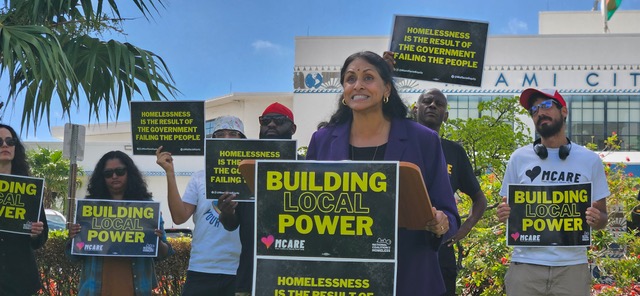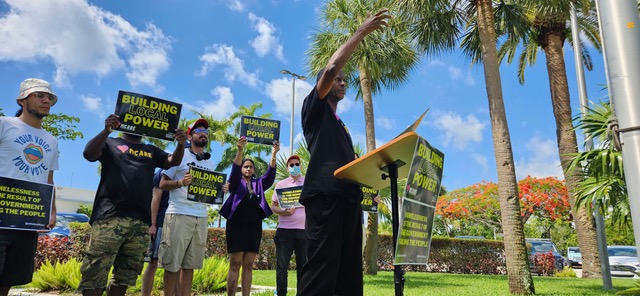In the past few years, the city of Miami Commission has taken several steps to crack down on homelessness in what many believe are inhumane ways — including banning food distributions and sweeps that separate homeless individuals from the few belongings they have. Ideas that have been floated include turning historic Virginia Key into a concentration camp of homeless, bussing them out of town — or having homeowners adopt a homeless person and take care of their needs.
Homeless advocates on Monday had a press conference at City Hall to announce a week of activities aimed at bringing awareness to and changing Miami’s policies that basically criminalize homelessness.
This was the first “Local Power Tour” of the National Coalition for the Homeless (NCH) in partnership with Miami Coalition to Advance Racial Equity (MCARE), to announce the start of their Building Local Power week, which includes meetings with local lawmakers and a presentation to the Miami Dade Homeless Trust.
Speakers at the press conference included Dr. Rajni Shankar-Brown, President of the National Coalition for the Homeless Board and Professor and Chair of Social Justice Education at Stetson University, Matthew Marr, Associate Professor of Sociology at Florida International University, and David Peery, Founder and Executive Director of MCARE.
“To criminalize poverty, pass restrictive housing laws, issue citations and ban food sharing creates more issues instead of creating needed solutions and healthier communities,” Shankar-Brown said. “The criminalization of homelessness violates universal human rights and actively perpetuates racial injustice.”
Said Marr: “We are calling on the City of Miami and all municipalities in Miami Dade County to end criminalization of homelessness, including sweeps. These measures impose a pervasive penalty on people living unsheltered by destroying their property and impeding their ability to connect with housing and services. We demand that the City of Miami report the effects of the ‘Homeless Empowerment Assistance Team’ on the people who have been swept. Where do they go? How do the sweeps get people into housing (not shelters)? What are the long-term trajectories of people who take up their offers of a single night’s stay in a shelter? We want answers!”
Peery said he wants the city to stop its police sweeps of the homeless. “Miami must stop traumatizing poor people who are condemned by poverty to sleep on our city’s streets,” said Peery. “Instead, the city should adopt constructive Housing First approaches to end homelessness.
Peery pointed to a recent study published in the Journal of the American Medical Association that he co-authored which demonstrates the violent impact of homeless encampment sweeps on people experiencing homelessness. The study shows the devastating impact of sweeps on individuals’ health, leading to increased overdoses, hospitalizations and early death.
“Sweeps are a form of violence against the homeless,” Peery said.
MCARE (Miami Coalition to Advance Racial Equity) is a 501(c)(3) nonprofit multiracial coalition of organizations seeking to advance social justice in Miami-Dade County. We view public policy through a racial equity lens: virtually all public policies either advance racial equity or increase inequities. Our MCARE Board of Directors — composed of student leaders, human rights lawyers, physicians and social justice advocates– reflects our richly diverse, multiracial Miami community. MCARE serves as the South Region Field Office for the National Coalition for the Homeless.


